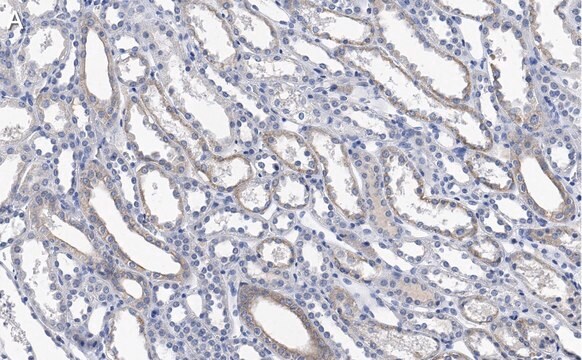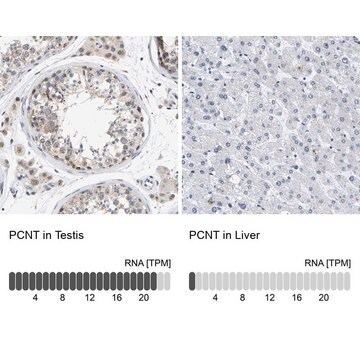MAB1876-Z
Anti-Integrin αVβ3 Antibody, clone 27.1 (VNR-1) (Azide Free)
clone 27.1 (VNR-1), from mouse
Synonyme(s) :
Integrin alpha-V, Integrin αVβ3, Vitronectin receptor subunit alpha, CD51, Integrin alpha-V heavy chain, Integrin alpha-V light chain, Integrin beta-3, Platelet membrane glycoprotein IIIa, GPIIIa, CD61
About This Item
IHC
immunohistochemistry: suitable (paraffin)
Produits recommandés
Source biologique
mouse
Niveau de qualité
Forme d'anticorps
purified antibody
Type de produit anticorps
primary antibodies
Clone
27.1 (VNR-1), monoclonal
Espèces réactives
human, rat
Technique(s)
flow cytometry: suitable
immunohistochemistry: suitable (paraffin)
Isotype
IgGκ
Numéro d'accès NCBI
Conditions d'expédition
dry ice
Modification post-traductionnelle de la cible
unmodified
Informations sur le gène
human ... ITGAV(3685) , ITGB3(3690)
Description générale
Spécificité
Immunogène
Application
Flow Cytometry Analysis: A representative lot detected the surface expression of vitronection receptor (VnR) complex on CHO cells co-transfected with αv and either wild-type β3 or the Cam variant of Glanzmann′s thrombasthenia with the Asp119Tyr mutation (β3cam) (Loftus, J.C., et al. (1990). Science. 249(4971):915-918).
Affects Function: A representative lot blocked M21 human melanoma cells from adhering to fibrinogen (Fg), von Willebrand Factor (VWF), or fibronectin (FN) coated surface in a Integrin αvβ3-dependent manner (Pilch, J., et al. (2002). J. Biol. Chem. 277(24): 21930-21938).
Affects Function: A representative lot blocked metastatic human breast cancer cells from adhering to collagen I matrix (Felding-Habermann, B., et al. (2001). Proc. Natl. Acad. Sci. U. S. A. 98(4):1853-1858).
Cell Structure
Adhesion (CAMs)
Qualité
Immunohistochemistry Analysis: A 1:50 dilution of this antibody detected Integrin αVβ3 in rat cerebral cortex tissue.
Description de la cible
Forme physique
Stockage et stabilité
Handling Recommendations: Upon receipt and prior to removing the cap, centrifuge the vial and gently mix the solution. Aliquot into microcentrifuge tubes and store at -20°C. Avoid repeated freeze/thaw cycles, which may damage IgG and affect product performance.
Autres remarques
Clause de non-responsabilité
Vous ne trouvez pas le bon produit ?
Essayez notre Outil de sélection de produits.
En option
Code de la classe de stockage
12 - Non Combustible Liquids
Classe de danger pour l'eau (WGK)
WGK 1
Point d'éclair (°F)
Not applicable
Point d'éclair (°C)
Not applicable
Certificats d'analyse (COA)
Recherchez un Certificats d'analyse (COA) en saisissant le numéro de lot du produit. Les numéros de lot figurent sur l'étiquette du produit après les mots "Lot" ou "Batch".
Déjà en possession de ce produit ?
Retrouvez la documentation relative aux produits que vous avez récemment achetés dans la Bibliothèque de documents.
Notre équipe de scientifiques dispose d'une expérience dans tous les secteurs de la recherche, notamment en sciences de la vie, science des matériaux, synthèse chimique, chromatographie, analyse et dans de nombreux autres domaines..
Contacter notre Service technique








